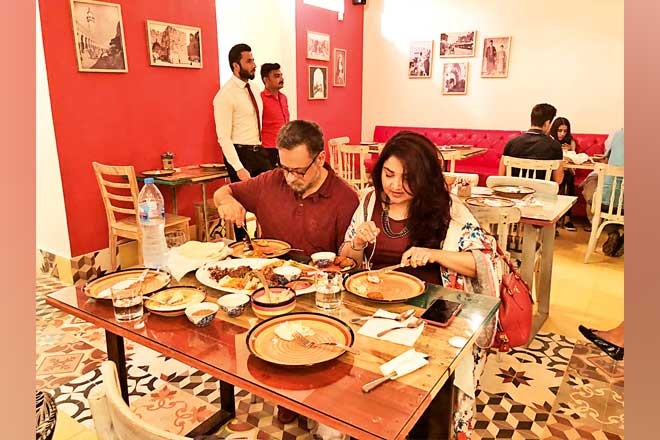

The newly opened Zaatar in Karachi has been drawing in crowds of food lovers who’ve been waiting for authentic Lebanese food to make its way to the coastal city for ages. It’s been worth their wait because the food served here is as close to authentic Lebanese as it gets in this side of the world. There are a couple of Lebanese options in the city and many restaurants also serve a choice of Lebanese items; hummus and shawermas are close to a staple in Pakistan - they stock and retail everywhere and are served at almost every restaurant serving barbecue - but they rarely touch authentic standards.
The mezze items at Zaatar are near perfection. I’ve now been twice and can say with confidence that the hummus (we always order the original recipe) is the perfect balance of chickpea, tahini, olive oil and lemon. I personally prefer my hummus to be slightly grainy and this one has managed to find the ideal consistency of being sophisticated without losing resistance. The moutabal, another essential part of the cold mezze platter, is good enough to convert anyone with a distaste for eggplant. The smoky undertone balanced with garlicky ribbons of joy are very, very irresistible. I must mention that the fresh pita baked at Zaatar is also light and airy. You don’t want to stock up on bread though.
One of my most favoured Lebanese appetizer is the falafel and I have to say that the Middle Eastern fritters do justice to their reputation at Zaatar. It’s another ‘must-order’ option when you visit. I have made a mental note to order the Kibbeh next time I visit as no Lebanese restaurant can pass the litmus test without getting the Kibbeh right.
Moving on to the mains, an easy choice is to order the mixed grill, which offers a combination of Kafta Meshwi, Shish Tawouk and Lahem Meshwi that has replaced the Baby Lamb Chops originally on the menu. I would opt for ordering separate mains because the Shish Tawouk - in my opinion - is a waste of protein. When at a Lebanese restaurant you want to stick to lamb (as opposed to chicken) and the Kafta Kebabs and Lahem Meshwi are melt-in-the-mouth delicious. We ended up ordering an additional plate of Kaftas when we first visited Zaatar and I would stick to them as well as the Lahem Meshwi. They come as grilled cubes of lamb roasted next to juicy bits of lamb fat.
One observation that the men at our table made is that the size of the kebabs and cubes of meat was a little insufficient. The skewers were a little small, whereas Lebanese servings are usually more generous. Another observation: to appease the Pakistani palate, the restaurant has had to sometimes overcook the lamb, which leads to slightly dry meat. Both these issues could be addressed and resolved.
The Lamb Shawerma, offered on a deconstructed platter, was another delight that we enjoyed sinking our carnivorous teeth in. I remember eating Lamb Shawerma on my recent trip to Beirut and I must say that I missed the inclusion of chips on the platter at Zaatar, but overall the combination of the charred tomato, onion and pickles was lovely.
Also speaking of Beirut, I remember being served the perfect Manakish (the Lebanese version of a small bite size pizza) and was delighted to sample the Mana’esh (both names are correct) at Zaatar. They serve the folded as opposed to the pizza version here but herbed up with a blend of zaatar spices it was just as delicious.
No meal can be complete without dessert and I would recommend you save stomach space for the Kanufeh, especially if you have a confirmation that it is available that day. This sugary cheese pastry enveloped with syrupy fried vermicelli is the sweet ending that you’ll need to conclude your meal at Zaatar with. I would recommend you fuss if it’s not available when you visit, which is often the case.
And don’t feel guilty about the Kanufeh because Lebanese food - in its olive oil drenched, sesame seed, chickpea and roast meat glory - is one of the healthiest food options in the world. Just take that thought away.